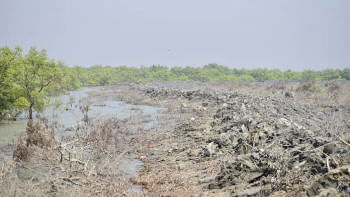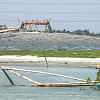When law enables environmental damage

Remarkably, Bangladesh has more than 200 environmental protection laws. Yet, our environment and natural resources continue to see unprecedented pollution, encroachment, and degradation. Being one of the countries that are most vulnerable to climate change, the way and at the scale that the country's natural resources are being exploited is immensely worrying.
Bangladesh ranks 177th among 180 countries in the Environmental Performance Index (EPI) 2022. According to the World Air Quality Report (AQI) 2023, Bangladesh has the most polluted air in the world. The state of noise pollution and river/water pollution is also grim. Research shows that 158 rivers have dried up or have been on the verge of extinction over the last 57 years in Bangladesh, due to encroachment, pollution, coastal embankments, and unplanned constructions.
Despite laws designed to protect the environment growing in number, their implementation continues to see a striking failure. The core problematic aspect of these laws is that they are designed to protect and benefit humans, not the environment within which humans live. By disaggregating humans from nature and enabling them to exploit natural resources to fulfil their needs, environmental laws have ended up legitimising and rationalising the destruction of natural resources and the degradation of the environment.
To provide context, let's take the example of the Environment Conservation Act, 1995, considered as one of the key laws in Bangladesh. A close reading of some of this law's provisions reveals its pivotal role in legitimising environmental destruction and producing and sustaining harmful practices that contribute to the creation and perpetuation of unjust environmental conditions.
The law reflects an "injury-therapy" model by allowing the degradation of the environment (injury) on the one hand, and restricting the detrimental activities to the environment (healing therapy) on the other hand. The law prohibits the cutting or razing of any type of hills and hillocks by any individual or institution. But it provides an exception allowing the Department of Environment (DoE) to issue a clearance certificate in favour of cutting or razing hills for the sake of "national interest." Similarly, the filling of reservoirs (river, canal, wetlands, etc) is prohibited, subject to an exception on the grounds of "national interest."
It is worth mentioning that the law does not provide any definition or explanation of the term "national interest." Naturally, this term, being overly broad and vague, leaves room for biased and arbitrary interpretation and provides space for manipulation. Now the question is, can the destruction of natural resources through razing mountains or filling reservoirs ever be justified in the national interest?
It is pertinent to note that the Supreme Court of Bangladesh recognised all rivers in the country as legal persons and living entities. Since the reservoir (river) is a legal entity, its loss or encroachment in the name of "national interest" is a clear violation of the apex court's ruling. While contradicting the framing of the rights of rivers and wetlands as separate living entities, the provisions also indicate how nature is treated as an object that can be tamed or exploited for satiating human needs. In this way, environmental damage is the intended outcome of a dysfunctional governance system where nature and humans do not co-exist, or only co-exist for the latter's benefits. The provisions also curate scope for committing environmental crimes within the bounds of the law.
In addition, the provisions regarding environmental pollution and degradation are too broad, vague, and loosely defined, providing ample scope for manipulation. Further, the provision regarding the prohibition of polythene shopping bags lacks clarity and precision. Although the production, import, marketing, and sale of polythene is prohibited, its export has been allowed, which is a violation of the "no harm principle" of the overarching international environmental legal scheme. The principle requires state parties to prevent, reduce, and control the risk of environmental damage to other states. The question here is: if polyethylene is harmful for the environment in Bangladesh, will it be beneficial for other countries? Or how is it possible to export polythene bags whose production is banned? As a result, the reality is that even after all these years post so-called banning, polythene bags are sold in the market and widely used in our daily lives. Such eccentric provisions of environmental laws are not only inconsistent with international law, but also raise questions about their credibility and proper implementation.
It may be argued that the abuse of "vague and loosely defined provisions" can be checked or overcome if there remains a proper monitoring body. Here, the problem is more acute in Bangladesh. The DoE is the core authority that is entrusted to control and oversee environmental pollution and undertake environmental protection measures. In outlining the DoE's role and functions, the law empowers the body with unfettered authority without inserting any corresponding duties or obligations. To put it simply, if the DoE fails or neglects to prevent environmental degradation and pollution, there is no provision to hold the agency accountable. Rather, the law provides exemptions to this implementing body if it undertakes activities in "good faith." In the absence of a proper definition or criteria for "good faith," there remains the possibility of using this saving clause to justify manipulating activities towards the environment while keeping the authority beyond accountability. It is worth mentioning that the High Court has repeatedly expressed dissatisfaction with the DoE's performance and questioned its disappointing role in preventing environmental degradation and pollution.
Apart from vague legal provisions and unaccountable institutions, the law fails to provide an effective forum to vindicate environmental harms and avail remedies against environmental crimes. Rather the concerned law provides a limited jurisdiction to the Environment Court to adjudicate environmental disputes. The Environment Court law creates a bar for general people to file complaints directly. The DoE has been made the authorised body to file cases on behalf of the aggrieved individuals. Due to such limited jurisdiction, legal bar, and lengthy procedural complexity, access to environmental justice is severely restricted which is evident from the low filing of cases to the environment courts. In the last 21 years since the creation of the Environment Court in 2003 till December 31, 2023, a total of only 587 cases have been filed to the environment courts which is an average of less than 28 cases per year.
This low frequency of environmental cases coupled with the rampant violation of the laws also indicates how the laws not only provide a restricted approach to environmental justice but also create an enabling atmosphere for environmental offenders to commit wrongs, remain unaccountable and thereby establish a culture of impunity. While carrying the above deficiencies, when the law fails to bring criminals to book, potential offenders get encouraged to commit environmental harms relentlessly. Here again, by creating legal bars and complexities regarding adjudication, law is playing a facilitative role in fuelling environmental injustices.
It is worth mentioning that in order to address the widespread failure of the implementation of environmental law, UNEP offered an Environmental Rule of Law framework that aims to reduce the gap between environmental laws on the books and in practice. The core elements of the environmental rule of law include, among others, fair, clear and implementable environmental laws, access to environmental justice, public participation and community-based approach in environmental law-making, accountability and integrity of institutions and decision-makers, and accessible, fair, impartial, timely and responsive adjudication of environmental cases.
It goes without saying that Bangladesh's environmental law framework is inconsistent with the core elements of the environmental rule of law which requires transformative reforms through addressing the vague, inconsistent, and rather scattered legal provisions that hinder effective environmental governance. Environmental rule of law is necessary to formulate clear and just environmental laws, to build strong environmental institutions, and to improve transparency and accountability, thereby increasing trust in the institutions and fostering a culture of compliance.
The failure to enforce environmental laws not only hinders environmental objectives but also creates obstacles to ensure inclusive and sustainable socio-economic development. The unabated pollution, degradation, and damage to natural resources as well as the environment, if not prevented, will also intensify our climate crisis and multiply the burden of climate adaptation, mitigation, and loss and damage. In addition, it will be difficult for us to avail of necessary grants and compensations from the international climate funds or to negotiate at the international fora unless we can ensure strong environmental governance and the rule of law at the domestic level.
Mohammad Golam Sarwar is a PhD researcher on climate law and alternative development at SOAS, University of London. He is also an assistant professor (on study leave) at the Department of Law in the University of Dhaka.
Views expressed in this article are the author's own.
Follow The Daily Star Opinion on Facebook for the latest opinions, commentaries and analyses by experts and professionals. To contribute your article or letter to The Daily Star Opinion, see our guidelines for submission.

 For all latest news, follow The Daily Star's Google News channel.
For all latest news, follow The Daily Star's Google News channel. 











Comments